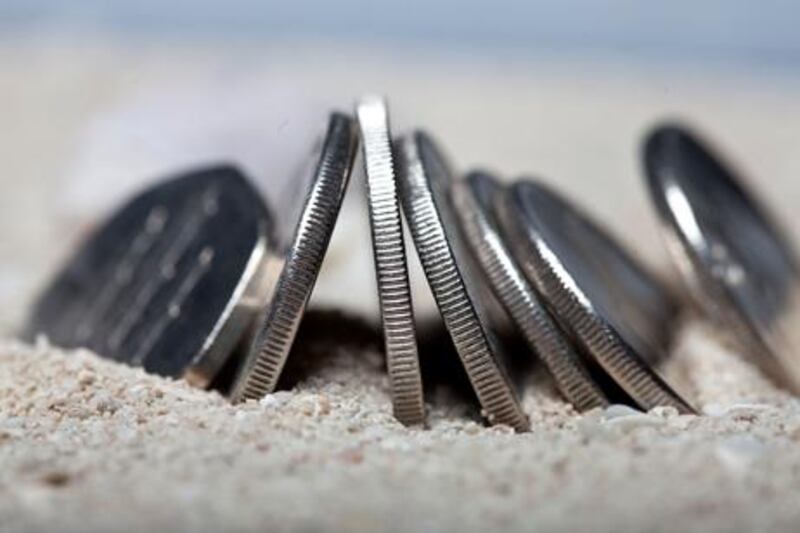Consumer and job confidence is likely to improve this year, although more than one in four UAE residents are less confident about their financial health than they were a year ago, according to a survey released on Tuesday.
Forty-one per cent of UAE residents said they felt less financially secure in the second quarter of this year compared to a year earlier, despite increased levels of job security, according to the quarterly Consumer Confidence Tracker released by comparison website yallacompare.
The figure is similar to the first quarter of this year when 42 per cent were doubtful about their finances, according to the tracker that polled about 1,350 people.
"The introduction of VAT had bigger consequences than many consumers realised, and many failed to balance these added expenses out with savings on, for example, rent," said Jonathan Rawling, the chief financial officer of yallacompare. "However, job confidence has improved since the first quarter of the year, with more people having reported seeing salary raises, and more people expecting a raise in the next 12 months."
Almost 35 per cent of respondents received a pay rise over the past 12 months compared to less than 30 per cent during the first quarter, according to the study. Overall job confidence increased by 4.4 percentage points quarter-over-quarter, and job security increased by 5.4 percentage points.
The UAE has introduced a raft of reforms aimed at boosting economic growth, creating jobs and diversifying the economy away from oil income. The measures announced over the last few months include a Dh50bn stimulus package for the emirate of Abu Dhabi, the waiving of corporate fines in Dubai and Abu Dhabi and allowing 100 per cent foreign ownership in companies in selected sectors from the end of this year. New UAE legislation that replaces bank guarantees for private sector labour recruitment with a low-cost insurance policy will also cut costs for employers and offer better protection to expat employees.
This has strengthened business sentiment in the UAE, which in turn improved job prospects for residents during the second quarter. Despite cost of living price rises due to VAT and higher fuel costs, expats said they are no more likely to leave the UAE due to their finances than they were in the first quarter of the year.
___________
Read more:
Cost of living decreases for expats in Dubai and Abu Dhabi - compared to other cities
Personal finance in the UAE: Residents track finances better but struggle with saving and debt
___________
The tracker, which first launched last year, found that only 23 per cent are more likely to leave the UAE due to price rises, slightly down on the first quarter. This suggests expats are more confident about their relative prospects in the UAE than in their home countries, yallacompare said.
Steve Cronin, founder of DeadSimpleSaving.com, an independent community to help UAE residents invest on their own, said that as the economic outlook for living and working in the UAE gradually improves, residents are also "getting better at surviving in these less glamorous times of mild austerity".
"Those who are seriously struggling tend to leave anyway, leaving a gradually more resilient and financially-savvy expat population," he said. "People are planning more sensibly for the future, with an increase in those reducing their debts, avoiding large future purchase and considering downsizing their homes."
However, Mr Cronin noted that this has not translated into savings rates, with fewer people saving more than Dh1,000 per month - 22 per cent in the second quarter, down from 30 per cent in the first quarter, according to the yallacompare study.
"That means they will have less of a cash buffer against future shocks and are not making the most of their time as an expat to build up long-term savings," said Mr Cronin.
When it came to making ends meet, just over half of respondents said that they are getting by but have had to make spending cuts as a result of VAT. This is less than the first quarter when 58 per cent said the same thing.
Almost one in four respondents now send more money home than last year and just under half reported having less credit card debt than they did 12 months ago.
Yallacompare also found that not all UAE residents are benefitting from the reported softening of the country’s property rental market. Just 20 per cent are currently paying less in housing rent than they were 12 months ago, and 39 per cent are actually paying more in rent.
"Our research suggests that, when it comes to negotiating with existing landlords, the majority of tenants struggle to get rent reductions. We suspect that many people don’t realise the strength of their bargaining position," said Mr Rawling.
__________
Read more:
Geneva most expensive expatriate city in the world, new study says
85% of UAE residents still not saving enough for their future: National Bonds
The expensive bills you can now pay monthly in the UAE
__________
For parents, eight in 10 are paying more in school fees than they were 12 months ago. However, those in Dubai will not experience a rise next year following a directive from the Dubai Executive Council in June to freeze fees at private schools across Dubai for the 2018-2019 academic year.
"The new government stimulus measures have improved business sentiment, and we would expect that to trickle-down to consumer confidence," added Mr Rawling. "We suspect, however, that as this trickle-down will take time, little or none of the consumer confidence that we’re seeing in our survey can be attributed to these measures. This is good news, meaning that we should see these effects come through in the second half of the year."







